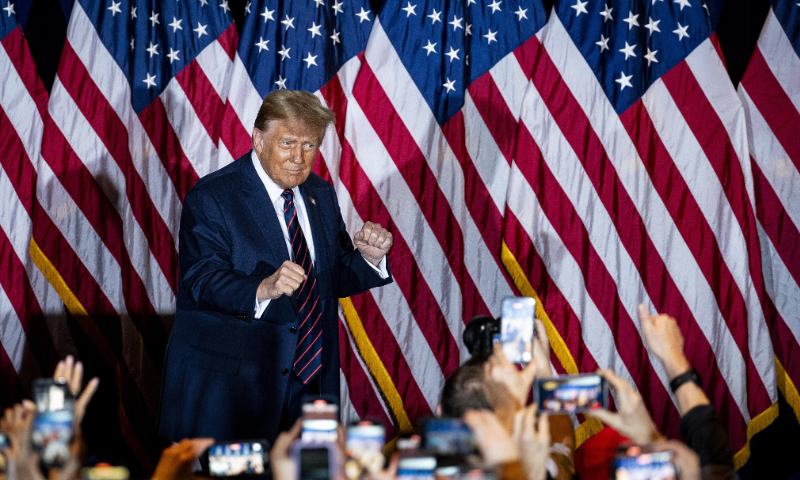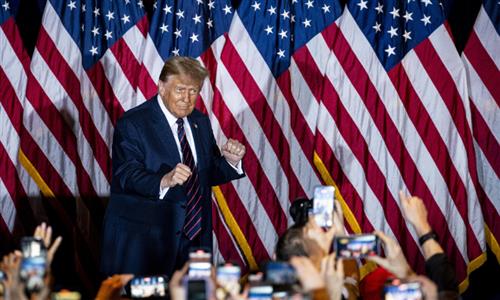
Former US President Donald Trump at a New Hampshire primary election night watch party in Nashua, New Hampshire, US, on January 23, 2024 Photo: VCG
Former US president Donald Trump's victory in the New Hampshire GOP primary further strengthened his bid to take on incumbent president Joe Biden in this year's presidential election, according to Chinese experts. They speculated that US voters may react with apathy toward a Biden-Trump rematch as disappointment for both candidates was growing; and that an unhappy electorate might seek to voice their discontent via extreme means, further tearing apart the US population.
Trump's back-to-back wins in Iowa and New Hampshire make him the only non-incumbent Republican candidate in modern political history to win the first two nominating contests. It intensifies pressure on his last remaining major competitor, Nikki Haley, to exit the race — which she insisted is not happening, according to US media report.
"This race is far from over, there are dozens of states left to go," she told supporters in a speech after the election was called for Trump, US media Politico reported on Tuesday.
Haley's path to becoming the GOP standard-bearer is narrowing quickly. She will not compete in a contest that awards delegates until her home state South Carolina's on February 24 primary, where polls show the ex-president holds a wide lead, AP reported.
It is almost certain that, barring the unexpected, it will be green light all the way for Trump to secure the GOP nomination this year, setting up a re-match with Biden, Lü Xiang, a research fellow at the Chinese Academy of Social Sciences told the Global Times.
The expert said another contest between the two has led to apathy among US voters, who deem the performances of both men as disappointing. "Four years ago many voters turned out as they wanted to cast out Trump, now they believe Biden is as equally disappointing. An unhappy electorate may seek extreme ways to express their discontent, including violence, protests …further tearing apart US society."
Few Americans are excited about a potential rematch of the 2020 election between Biden and Trump, according to a poll from The Associated Press-NORC Center for Public Affairs Research published in December, 2023.
AP quoted Randy Johnson, 64, a Republican as saying that "I find it sad for our country that that's our best choices," and added: "We're down to the lesser of two evils."
Xin Qiang, deputy director of the Center for American Studies at Fudan University, told the Global Times that "it's certain that throughout the process of this rematch, personal attacks, stigmatization and smearing will be the main tactic. They will try to make each other look like the biggest threat to democracy and strengthen their own legitimacy. Whoever wins, the US will be further torn apart."
This is likely to lead to more internal friction; and the US political system needs compromise between the two parties, between the White House and the Congress, and also between the Federal government and the states, to make the whole system functional, but in the future, compromise will be extremely difficult, experts said.
Other countries are also nervous about the US election result. A piece ran by the Economist published on Monday said that governments around the world are already developing alternative plans for a second Trump administration.
A CNBC article last week claimed that Trump's potential return to the White House dominated the conversation at this year's edition of the World Economic Forum in Davos.
"Every question I've gotten as I've walked up and down the [Davos] Promenade today is, 'is he coming back?'" Tim Adams, president of the Institute of International Finance, told CNBC.
The US diplomacy will increasingly become the hostage of its fractured domestic politics, as the countries diplomatic decisions will be made not in accordance with logics of diplomacy, but to satisfy the tactical interests of domestic politics, Lü said.
He said that a fragmented US will create more uncertainty for a world already in turmoil, and countries around the world, even US allies should steel themselves for such uncertainty.

